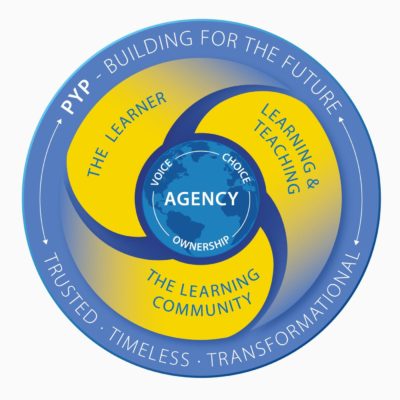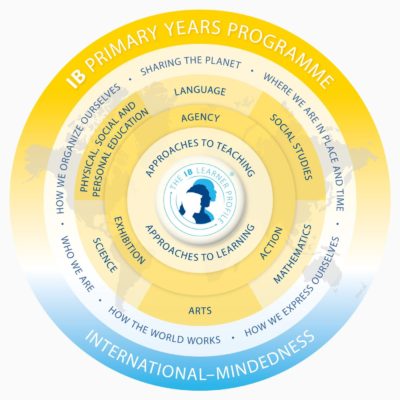Hillside uses the International Baccalaureate’s Primary Years Programme (PYP) as its curriculum framework and has been an authorised IB World School since January 2013. The school has completed its first evaluation visit from the IBO in November 2018.
How do children learn at Hillside?
Children at Hillside develop their knowledge, skills, attitudes and understanding of concepts through play-based inquiry. Classrooms foster curiosity and promote discovery by making learning relevant to the “real world” and challenging for each child. We start from children’s prior knowledge and build on each child’s strengths, experiences, and cultural and linguistic background to support learning. We encourage children to become independent learners and critical and creative thinkers who are empowered to take action. Click HERE to see a typical day at Hillside. The resource Inquiry through play – supporting PYP parents is a resource for parents of early learners. It provides a short introduction to the power of play, how to support learning through play and some examples of what this could look like in practice.
What is the PYP Curriculum Framework?
The curriculum framework is made up of three pillars:
| The Learner |
|---|
|
We all have AGENCY, the capacity to act intentionally. Recognising and supporting agency in the PYP will create a culture of mutual respect, acknowledging the rights and responsibilities of students, schools and the wider learning community, enabling students to take ownership of their learning and teachers of their teaching. The EARLY LEARNER includes young students from 3-6 years. The PYP highlights the importance of planning uninterrupted time for play, building strong relationships, creating and maintaining responsive learning spaces and engaging in symbolic exploration and expression. LEARNER PROFILE Attributes will be reinforced and brought to life throughout the learning community. ACTION will still draw on inspiration and innovation in the PYP. We will be encouraging students to explore different demonstrations of action as participation, advocacy, social justice, entrepreneurship and lifestyle choices. |
| Learning and Teaching | ||||
|---|---|---|---|---|
|
Teachers will collaboratively develop a PROGRAMME OF INQUIRY (POI), and decide the most appropriate time frames and duration for each Unit of Inquiry (UOI). Teachers will integrate subject knowledge and CONCEPTS into each unit to deepen transdisciplinary learning and develop transdisciplinary skills or APPROACHES TO LEARNING (ATL). The knowledge component is developed through inquiries into six transdisciplinary themes of global significance, supported and balanced by six subject areas.
ASSESSMENT will embody a more holistic design, incorporating both a reflective and forward-looking approach. Teachers understand the importance of keeping parents informed about their child’s progress in their learning and development journey. Communication is key, and we have various ways to ensure regular updates and meaningful interactions. Teachers keep parents informed through various channels as we firmly commit to creating a strong two-way home-school partnership that nurtures the children’s growth and development. Please CLICK HERE for the Hillside Assessment Policy. Diversity in schools provides an opportunity to support student agency, affirm cultural identity and develop international-mindedness through LANGUAGE. Teachers will build a positive culture of language learning through multiliteracies, multilingualism and translanguaging. Teachers support students in understanding and committing to academic integrity, which means being honest, taking responsible ownership of their own learning, and acknowledging the ideas of others. Please CLICK HERE for the ESF Academic Integrity Policy. |
| Learning Community |
|---|
|
In building A COMMUNITY OF LEARNERS, we will focus on inclusion and well-being to foster positive and trusting relationships, selfefficacy and agency across our school community. Teachers will support the integration of INTERNATIONAL MINDEDNESS through action, agency, language, the learner profile and the shared responsibilities of the learning community. LEADERSHIP will explore different ways to draw on a range of capabilities to innovate and encourage agency in a PYP school. Students, teachers and all members of the learning community take on formal and informal leadership roles, to discover new ways to reach shared aspirations together. TECHNOLOGY will involve immersing students in the interplay between learning technology, learning about technology and learning through technology. Teacher and students will co-create flexible, inviting and intentional LEARNING ENVIRONMENTS, essential for supporting agency, physical and emotional well-being, and inquiry based learning. |
This diagram shows how all of these elements fit together to develop the curriculum framework.
Information on this page was taken in part from: “PYP: From Principle to Practice” 2018. For further information, please visit: www.ibo.org

